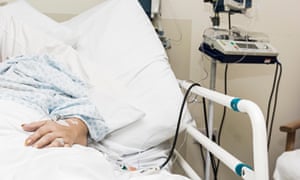‘It’s the best feeling in the world knowing that you were able to care for someone during their last days’
I saw my first patient death a few months ago, during my first placement on a medical ward. It was a woman with dementia. I was there when the doctor made the decision to remove her oxygen mask. We drew the curtains and I rubbed her leg, just to let her know that someone was with her. I was glad to be there as she took her final breaths.
I still think about her. She was unmarried and had no family. She died alone, but we were there, so I guess she wasn’t completely alone.
We joke about certain things on the ward – obviously nothing inappropriate, but humour needs to come into it. The woman had a pair of glasses, and while I was packing her stuff away to bring down to the morgue, a nurse asked me: “Do you think she’ll be needing them?”. We needed a little laugh.
I don’t think anything can prepare you for seeing a patient die. But as a student nurse, it’s the best feeling in the world knowing that you were able to care for someone during their last days and moments, holding their hand.
I went home, where my flatmates are student nurses with their own experiences of death. We sat down and talked it through, which made me feel better. I’d recommend that to new students: make sure you can talk about losing a patient. There’s lots of support out there. First-year nursing student

‘It changes your personality’
Working on the stroke ward was the hardest. Deaths came as more of a shock there because the patient would often have been around for weeks. One morning I admitted a man with his wife. I chatted to them all day – they were lovely. But then he became unresponsive. I did all the tests and noticed that he wasn’t reacting to my voice or pain. His wife was standing right next to me. It was my first emergency situation and I had to comfort the family at the same time. I was trying not to cry in front of them – they were so friendly. It isn’t always the way with relatives when they’re stressed.
Death is more common on other wards. I remember a woman who needed blood transfusions and had to go to intensive care. But she refused. The staff said: “This is serious, you might die if you don’t.” At that point she got quite mouthy.
She eventually said yes to intensive care, but she didn’t get there on time. It wasn’t a dignified death. There was blood pouring out of her in the middle of a transfusion, in front of other patients. She might have been able to recover – but you have to respect the patient’s right to make their own decisions. It was a gnawing feeling, knowing that it could have been different.
The course changes your personality a bit. You cope with stress better after dealing with upsetting situations. It’s like a second skin you develop; I feel like being upset but there’s no time. My philosophy is better nowadays – I’m doing my best to keep people healthy and if the death was unpreventable, I just have to accept it and move on. If I don’t, you can’t be there for the family or the other patients. Third-year nursing student

‘It’s important not to shy away from death. You can learn a lot’
It was my fourth day of being on a ward. The patient was an elderly man who’d been in a traffic accident. It was frightening, only being 18 and experiencing that so soon. I was there with the doctor the moment he passed away.
I was worried to begin with. Sometimes, as a student nurse nobody realises you haven’t seen this stuff before. There were doctors and nurses all around me in a busy, enclosed space. Fortunately, the patient wouldn’t have had any idea of what was going on around him.
When I saw that first dead body, I thought, “I don’t know what I’m doing”. I didn’t know how I was supposed to tell the family, or how to clean a body or who to call. It did knock my confidence. But you get used to it – it doesn’t sound like a nice way to put it, but you do.
I stayed with the doctor while he certified the death. I had to listen to the patient’s breath for five minutes to see if there were any sounds. I was lucky to have a good mentor who made sure I was all right afterwards and explained how to tell the family. The nurses seem grateful to have a second pair of hands. People often take the opportunity to teach you even though they’re under a lot of pressure.
I try not to take any of it home with me. I used to live with other students who weren’t studying nursing. I’d come home and they’d listen to my stories, but no one could really relate. They’d just been at lectures or sleeping in all day. Now I live with nurses, which is a lot easier because they get it.
I’ve found it’s important not to shy away from death. You learn a lot if you get involved as much as possible, right from the beginning of your course. Third-year nursing student
Keep up with the latest on Guardian Students: follow us on Twitter at @GdnStudents – and become a member to receive exclusive benefits and our weekly newsletter.
"I don"t think anything can prepare you for seeing a patient die"
Hiç yorum yok:
Yorum Gönder